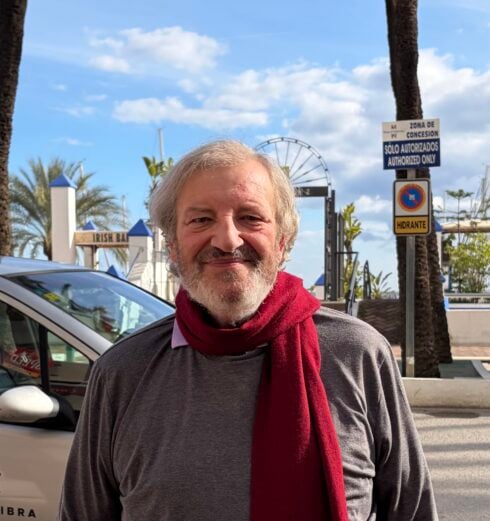EXCLUSIVE By Yzzy Bostyn
WHEN Cor Vandenhoek moved to Torrox Costa nine years ago, he invested in one of the most expensive properties on the market under the promise that nothing would ever obscure his view to the sea.
It was a vow that was sadly to be broken.
Just seven years later, the abandoned lot in front of the Dutchman’s upmarket Punta del Faro Urbanisation is ‘inundated’ with over around 60 new homes.
Not the sort of bricks and mortar properties that you might expect an expat homeowner would be complaining about sullying his view… but a phalanx of illegally-parked camper vans, whose occupants’ behaviour leaves a lot to be desired.
The retired hotel owner has certainly got a point, with the long line up of campers stretching almost as far as the eye can see.
READ MORE: Frustrated expat blasts ‘illegal vanlifers’ who ‘throw human waste’ onto beach

Photo: Doug Fairchild
It is a similar picture at hundreds, possibly thousands of beauty spots, from Huelva up to the French border with Catalunya.
While ugly it is what the so-called ‘van lifers’ get up to in them – and outside of them, crucially – that has most incensed Cor and, as the Olive Press has established, thousands of his neighbours and fellow expats along the costas.
“I wanted to retire and have a quiet life here but I have never seen such chaos. Torrox was a beautiful place, the Saint-Tropez of Spain, but now it’s being abused and we can do nothing about it,” the 75-year-old told the Olive Press.
Cor claims he has seen the caravaners ‘masturbate in broad daylight’ and ‘throw human faeces’ in the bushes from his balcony. And it’s a story we have been hearing for months, since we first reported on the issue.

Photo: Cor Vandenhoek
“I can’t even walk my grandchildren to the beach because there’s dirty tissues, condoms and s**t everywhere,” continued Cor, who sent us a series of photos as evidence, as have many other readers from around the costas.
The pensioner also claims the van lifers put their rubbish, including human waste, into his urbanizations’ bins, paid for out of each resident’s €128 per month maintenance costs.

Photo: Cor Vandenhoek
It is a similar story up the coast in Fuengirola.
Age Care volunteer Ray Mynott, 77, told the Olive Press that he had seen many caravaners dump excrement around the fairground.

Photo: Ray Mynott
“They also dump their s**t in the storm drains, blocking them, or directly dump them in the Parque del Rosario.
“When we go to walk the dog, there’s a really unpleasant smell and I’ve even seen someone park their van over the storm drain to empty their waste directly into it. This goes down into the river and into the sea.”
The former chauffeur continued: “I’ve also seen people take around 16 litres of water from the park in a single day. They literally just park up and fill all their containers. They don’t pay any taxes for that.”
And the local welfare leader added that many expats believe the van lifers are up to no good.

Photo: Ray Mynott
“A lot of people in the Los Boliches area do not feel safe anymore because we don’t know who these people are,” he explained.
“The council thinks it’s helping the economy, but when I asked one of the restaurant owners near the feria ground where they all park he told me all the campers do is use their toilets.”
And it is not as if the van lifers disagree.
Veteran traveller and member of the Catalan Caravaners Union (UCC) Cesar Semarro told the Olive Press this week: “There’s always some pigs that behave badly. They ruin it for the rest of us.”

Photo: Cesar Semarro
However, he insisted this was a small minority of motorhome owners who do not represent the largely ‘respectful’ community.
The 78-year-old, who has been travelling in mobile homes for over 50 years, explained that the style of travel skyrocketed in popularity during the Covid-19 pandemic.
“People came to Andalucia because it’s a paradise with year-round sun. But because of the pandemic, they didn’t know the etiquette,” he confirmed. “Now they abuse the system, especially the snowbirds who come for winter,” he added.
Above all, he insisted it was important to understand the difference between parking and camping.
Parking for a day or two he believes is an entirely acceptable norm and gives everyone a chance to enjoy places.
“But camping is staying for months and acting like the street was your back garden. These people give us a bad name.”

Photo: Cesar Semarro
Huge growth in numbers
The Olive Press has established that around 350,000 motorhomes are normally to be found travelling around Spain, with the majority coming from abroad.
According to the Spanish Caravaning Association (Aseicar) 6,459 new motorhomes were registered in 2024, a 22% increase compared to the previous year.
Despite this, Spain only has 1,100 camping areas compared to 7,500 in France and 5,700 in Germany, forcing campers into illegal parking spots.
Catalan Semarro claims these campers are a great source of income, especially in ‘empty Spain’ (by which he means the interior) which of course is largely true.
“Our association and others like ours offer guidelines on how to behave and if these rules are followed, you should be welcomed by locals with open arms.
“That means spending money in bars, shops and restaurants,” he said.
“If a small inland village has 50 residents and four or five caravaners come and spend money, that’s a good income for the local villagers.”
One inland village, L’albi, in Lleida province, allegedly calculated €62,000 in local sales from motorhome owners in just one year alone after providing a safe parking area, including toilets, water and picnic tables.

PHOTO: Ajuntament de L’Albi
However, most towns in Spain lack these essential facilities, caravaners claim.
And it is not only losing vital income, but it is causing problems.
“The coast is oversaturated for sure and many campsites are booked up a year in advance,” regular British traveler Alan Harris, from Dorset, told the Olive Press.
“I think the solution is for councils inland to provide proper sites with facilities and then charge a small fee. That’s what they do in France and the situation is much better.”
The 70-year-old former plumber continued: “I once spent €1,000 in a week in Javea, if you multiply that by the amount of people, that’s an awful lot of money for the local economy,” he said.
“Despite this, Javea council moved the campers on and the nearby bars were utterly horrified, they’d just lost lots of business.”
However, he admitted that some caravaners – mostly Germans – come to Spain with ‘huge’ vans loaded up with supplies.
“It’s mostly Germans who don’t want to spend money and overstay their welcome,” he claimed.
He also admits that many long-term caravaners are moved on following complaints from residents who own ‘expensive’ beach-side homes.
One classic person who regularly overstays her welcome, by her own admittance, is Therese Erikkson, 33, from Sweden.
READ MORE: Spaniard converts bargain bus into travelling hotel for family holidays

The vanlife videographer appears to wind up local residents.
“My favourite spot in Marbella is in front of some million euro mansions,” she boasted.
“They hate us parking in front because they see us as a threat to normal society, they want you to be in the rat race with them.”
While describing life in Marbella, or anywhere on the costas, as a ‘rat race’ seems a little wide of the mark, it is the fact that van lifers and most winter visitors are not obliged to pay local taxes, that really annoys residents.

Photo: Therese Erikkson
And some are unlikely to pay tax at all going on investigations of large van-lifer settlements by the Olive Press around Orgiva, in Granada, and in particular, up on the Algarve, in nearby Portugal.
Erikkson has crossed paths with many such undesirables, saying on her YouTube channel that she frequently sees gay men having intercourse in bushes and has had to chase off men masturbating over fellow van lifers.
But being fair, most of the van lifers are simply looking to drop out and are largely harmless, choosing alternative ways of life.

Photo: Therese Erikkson
And some of them, including freelancer Erikkson, is all for contributing more to the local authorities.
“I think a subscription system would be good, a yearly membership to park wherever you want in Spain for €50 to €100,” Erikkson, who trains photographers, suggested.
“We’re mostly hardworking, normal people who want to travel. I hope Spain can see that we contribute to society.”
It’s a question that will raise much debate but, unless it is better regulated and can be proven to contribute to the local economies, it will end up causing much more conflict over the years to come.
What does the law say?
Caravans and motorhomes can legally park just the same as normal vehicles in Spain. However, Spanish road authorities (DGT) updated the law in June 2024 so that campers cannot take up more space than the vehicle itself (for example, by putting up a hammock or shade), stand on anything but wheels and emit any fluids such as chemical toilet waste.

While it was lauded as ‘protecting’ caravaners, the law failed to include other types of mobile homes, including converted vans.
The new regulation also did not clarify if it is permitted to sleep in mobile homes, but most have interpreted the law as a green light, saying as long as vehicles are parked correctly, they can do as they please.
Many municipalities however, have their own rules when it comes to overnight parking, so make sure you check before taking a lie down.
Fines can range from €200 in prohibited areas and up to €60,000 in environmentally-protected areas.
READ MORE: How British expat turned land rover into luxury home ahead of ‘mammoth’ road trip through Africa
Click here to read more Spain News from The Olive Press.








